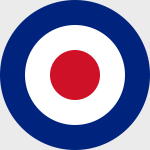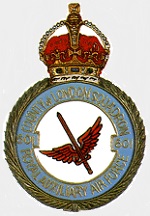Hobby Master HA7852 RAF Supermarine Spitfire Mk. Vb Clipped Wing Tropical Fighter - No.601 Squadron, Libya, December 1942 (1:48 Scale)
"The Millionaires' Squadron"
- Nickname given to No.601 Squadron
 The Spitfire is the most famous British aircraft of all time. Although less numerous than the Hawker Hurricane, it is remembered as the sleek, thoroughbred fighting machine that turned the tide during the Battle of Britain. The Spitfire was among the fastest and most maneuverable prop-driven fighters of World War II, serving in virtually every combat theater.
The Spitfire is the most famous British aircraft of all time. Although less numerous than the Hawker Hurricane, it is remembered as the sleek, thoroughbred fighting machine that turned the tide during the Battle of Britain. The Spitfire was among the fastest and most maneuverable prop-driven fighters of World War II, serving in virtually every combat theater.
Supermarine designer Reginald Mitchell created this small, graceful, elliptical-wing fighter with eight guns in the wings that were able to fire without being hindered by the propeller. The immortal Spitfire thus became not merely one of the best-performing fighters of all time, but also one of the best-looking. Although never employed as a long-range escort, the Spitfire was a champion in an air-to-air duel. Spitfires routinely dived at the speed of sound, faster than any of the German jets.
A carrier-based version, called the Seafire, was a winner in its own right, serving valiantly on convoy routes during World War II. The Seafire 47 was even used in the early stages of the Korean War, before it was replaced by more modern jet aircraft.
Pictured here is a 1:48 scale replica of a Supermarine Spitfire Mk. Vb clipped wing tropical fighter that was attached to No.601 Squadron, then deployed to Libya during December 1942.
Sold Out!
Dimensions:
Wingspan: 9-inches
Length: 7-1/2-inches
Release Date: August 2019
 Historical Account: "County of London" - No.601 Squadron was formed at Northolt on October 14th, 1925, as a light bomber unit of the Auxiliary Air Force. A nucleus of permanent staff was posted to the squadron and on December 4th the first Auxiliary personnel were enlisted. Flying did not begin until May 1926 and it was the following year before the Avro 504Ks were supplemented by D.H.9A light bombers. In January 1927, the squadron moved to Hendon, which was its base up to the outbreak of war, apart from a few days during the Munich crisis in September 1938. In November 1929, Waptis began to arrive and a year later had replaced all the D.H.9As. These were in turn replaced by Harts by June 1933 and on July 1st, 1934, the squadron was redesignated a fighter unit. The Harts were retained until replaced by Demons in August 1937. In November 1938, No.601 converted to Guantlet single-seat fighters, but in January 1939 began to receive Blenheims. It was with these that fighter patrols began when World War Two broke out in September 1939, but in March 1940, the squadron had converted to Hurricanes. During the German invasion of France, a detachment operated from French soil for a week, followed by defensive duties during the Battle of Britain while based in southern England.
Historical Account: "County of London" - No.601 Squadron was formed at Northolt on October 14th, 1925, as a light bomber unit of the Auxiliary Air Force. A nucleus of permanent staff was posted to the squadron and on December 4th the first Auxiliary personnel were enlisted. Flying did not begin until May 1926 and it was the following year before the Avro 504Ks were supplemented by D.H.9A light bombers. In January 1927, the squadron moved to Hendon, which was its base up to the outbreak of war, apart from a few days during the Munich crisis in September 1938. In November 1929, Waptis began to arrive and a year later had replaced all the D.H.9As. These were in turn replaced by Harts by June 1933 and on July 1st, 1934, the squadron was redesignated a fighter unit. The Harts were retained until replaced by Demons in August 1937. In November 1938, No.601 converted to Guantlet single-seat fighters, but in January 1939 began to receive Blenheims. It was with these that fighter patrols began when World War Two broke out in September 1939, but in March 1940, the squadron had converted to Hurricanes. During the German invasion of France, a detachment operated from French soil for a week, followed by defensive duties during the Battle of Britain while based in southern England.
In February 1941, the squadron began taking part in offensive sweeps over northern France which continued until August, when re-equipment with Airacobras began. These proved useless and were discarded in favor of Spitfires in March 1942, but after only a few minor operations. In April the squadron sailed for the Middle East and re-assembled in Egypt on June 25th. Fighter sweeps over the Western Desert started a few days later and after the rout of the Afrika Korps at El Alamein, the squadron moved westwards to Tunisia, where it was present at the end of the North African campaign in May 1943. Next month, it flew to Malta to cover the Allied landings in Sicily moving into captured airfields in mid-July. In October, No.601 moved to Italy, where it spent the rest of the war flying ground attack missions in support of the Allied armies. On August 14th, 1945, the squadron was disbanded.


